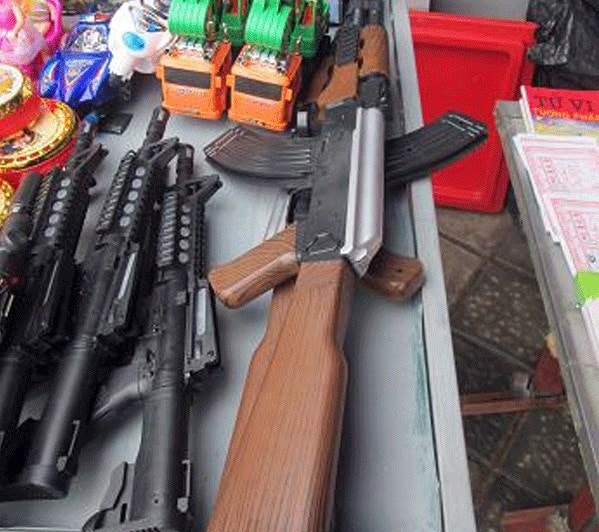Violent toys from China flood the market
90% of the toys sold in Hanoi are from China. Many stores still openly sell violent toys, even though they are listed as prohibited items.
 |
Toy guns for sale, made in China.
Cheap price so just floating
That is the opinion of many toy store owners recorded by PV. On Nguyen Quy Duc Street (Thanh Xuan District), there is a long row of toy stores, in which more than 90% of the products are of Chinese origin. "The store only has a glowing pen made in Vietnam, the rest are from China" - said a toy store owner opposite the gate of Dang Tran Con A school. The most popular toys at the store are robots, puzzles, dolls... which look quite eye-catching and are all labeled "made in China".
According to shop owners, the reason for importing toys from China is quite simple: cheap price, rich designs, suitable for children's psychology as well as the budget of most parents. "Products from China are always cheaper than those from Vietnam, and at the same time, the products are diverse, so they are chosen by many young customers" - said Ms. Nguyen Thi Oanh, a toy shop owner on this street.
The same situation also occurs in other toy selling areas in Hanoi such as Hang Ma and Hang Luoc streets... Many shop owners admit that due to their outstanding advantages and competitive prices, goods originating from China always dominate the majority of the current toy market.
Potential for accidents, but management is still lax
In fact, the business of toys originating from China is fraught with unpredictable risks if not strictly managed. With just a few tens of thousands of dong, "young" customers can buy a plastic bullet gun to play with, or electronic guns, swords, knives... During holidays and Tet, these items are sold more commonly, most of which are of Chinese origin. Plastic bullet guns come in all types and sizes, from pistols to rifles, with infrared sights, shaped like guns, and are sold for 150,000 - 400,000 dong/gun. These guns have very strong shooting power, and if fired at people at close range, they can cause injury.
While in the city, the sale of toys is still somewhat controlled, on the contrary, in many rural areas, this situation is almost left unchecked. Typically, at rural markets, toy stalls in the suburbs of Hanoi are still full of these banned goods. "Oh, they are toys, they are not real, so why are you worried? I have not seen anyone get hurt because of these things" - said a toy shop owner on Tia Street (Thuong Tin District, Hanoi).
Mid-Autumn Festival - the season when toys sell well - is approaching. Will the authorities take this opportunity to take a serious action against the sale of violent toys?
According to Labor






